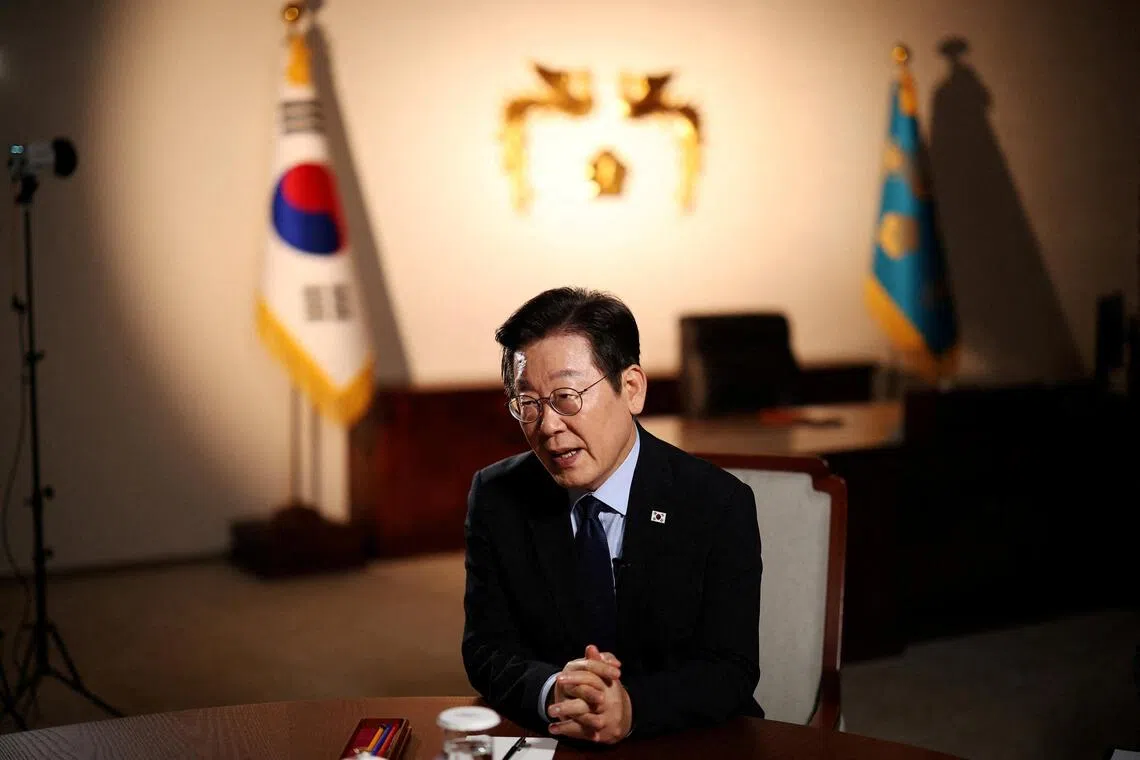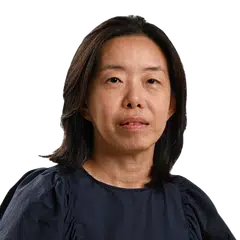News analysis
How Seoul is strategically turning Hyundai raid fallout to its advantage
Sign up now: Get insights on Asia's fast-moving developments

South Korean President Lee Jae Myung said that he believed the incident could strengthen Seoul’s relationship with Washington.
PHOTO: REUTERS
- South Korea aims to leverage the Hyundai raid to strengthen ties with the US despite public outcry and investment concerns.
- Seoul seeks favourable terms in investment negotiations, like currency swaps, due to limited reserves, after pledging US$500 billion to the US.
- US regrets the raid and is working with South Korea to revamp the visa system, aiming to maintain investment flows.
AI generated
SEOUL – The South Korean government is hoping to turn to its country’s advantage the Sept 4 immigration raid
While describing the incident as “shocking” and acknowledging that the country’s businesses would likely be “more hesitant to invest in the US”, South Korean President Lee Jae Myung said in an interview with the BBC published on Sept 22 that he believed the incident could strengthen Seoul’s relationship with Washington.
“There’s a Korean proverb that says, ‘after the rain, the ground hardens’,” said the President during the interview.
Days earlier on Sept 19, his foreign minister, Mr Cho Hyun, had urged calm amid a public outcry over allegations of US human rights violations endured by the South Korean detainees, and said that the US-South Korean alliance is strong enough “to overcome this issue” and for a “silver lining” to be found.
Analysts told The Straits Times that the government’s restrained and even optimistic response despite the heated domestic sentiment is a strategic move which allows it to steer ongoing tariff negotiations in its favour and to kick-start long-delayed discussions to revamp the visa system for South Korean workers headed to the US.
“Patience here is smart politics. The government knows public opinion is heated, but showing restraint now puts them in a stronger position to collect gains in the negotiations ahead,” said economist Lee Mun-seob from the University of California San Diego.
The immigration raid had come on the heels of the summit of the two countries’ leaders on Aug 25, where Mr Lee had presented a US$150 billion (S$192.4 billion) investment pledge
This was a top-up of an earlier US$350 billion investment promise made by Seoul as part of a framework tariff deal which saw initial tariff rates imposed by the US on Korean imports slashed from 25 per cent to 15 per cent.
Seoul is still ironing out the specifics of the investments, with Washington pushing for a hard deal for the bulk of the investment pledge to be made in cash upfront.
Mr Lee has warned that given South Korea’s relatively modest foreign cash reserves of US$415 billion, such a huge cash outlay would strain his country’s reserves and push it into a financial crisis.
In comparison, Tokyo, which has pledged US$550 billion in investments in a similar tariff deal with the US, has more than US$1 trillion in foreign currency reserves.
Seoul is thus looking instead to negotiate for more favourable terms, such as an unlimited currency swap arrangement, to ease the pressure on its US dollar reserves and currency stability.
Non-resident fellow Troy Stangarone of the Carnegie Mellon Institute for Strategy and Technology in Pennsylvania said that Washington’s realisation that it has pushed South Korea too far with the immigration raid incident “gives South Korea space to push for a fairer investment deal”.
He told ST that South Korea has done well in not seeking to place blame but to be firm in what it needs to secure the release of the workers and to move forward with investment in the US.
“If it can continue to use that strategy to reach a mutually acceptable compromise with the Trump administration on visas and the investment framework, it should benefit both countries in the long run,” added Mr Stangarone.
Mr Trump, who initially called the South Korean detainees “illegal aliens” and called on foreign investors to respect US immigration laws in a Truth Social post on Sept 8, has since scaled back his comments.
The US authorities had earlier justified the raid by saying that the South Korean workers employed at the battery plant jointly owned by South Korea’s Hyundai Motor Group and LG Energy Solution had entered the country illegally or were working under improper or expired visas.
Many of the workers were said to be on the Electronic System for Travel Authorisation (Esta) visa waiver programme, which is intended for short-term trips of up to 90 days for the purposes of business meetings and contract signing only, rather than the H-1B visa meant for specialised workers.
The H-1B visas are notoriously hard to get as the US awards only 85,000 such visas a year on a lottery basis, with the bulk of these going to Indian workers.
In a subsequent post on Sept 15, Mr Trump said that he did not want to “frighten off or disincentivise” investment in the US, and that he welcomed foreign companies and their employees to teach and train Americans.
Apart from investments, the US is also counting on South Korea to help revitalise its shipbuilding industry to counter the dominance of China, which now boasts the world’s largest navy.
But the raid has incited much outrage in South Korea, with a poll released on Sept 9 showing that 60 per cent of 500 respondents viewed the crackdown as “excessive” and expressed disappointment with the Trump administration.
Labour activists have staged protests outside the US embassy in Seoul, calling for investments in the US to be halted.
Detainees who were flown back to Seoul on Sept 12 via a specially chartered flight told local media under the condition of anonymity that they were crammed into detention dormitories with dirty bedding and open-concept toilets that were shared among many people and were dirty.
Those with chronic medical conditions were allegedly not given medication, and detainees complained of having to drink tap water that smelt of sewage, while the meals also smelt bad.
At least two victims, including a pregnant woman, said they were still traumatised by their experience and feared going out now even though they were back in Seoul.
In a damage control move, US Deputy Secretary of State Christopher Landau met Seoul’s Foreign Ministry officials on Sept 15 and voiced his deep regret over the incident.
Both governments have since established a task force to look into restructuring the visa system for South Korean workers, while Seoul says that it is also looking into the detainees’ complaints.
Speaking to foreign media based in Seoul at a press briefing on Sept 19, Foreign Minister Cho tried to downplay the allegations of US officials’ excessive use of public authority, saying that “since it occurred in the course of the US’ domestic law enforcement, we will look at it from that perspective”.
To ST’s query on how many of the detained South Koreans were in violation of US immigration law, Mr Cho responded that he did not know and that results from the ongoing investigation would “shed more light on the matter”.
Mr Cho also emphasised the need to look at “the larger picture” and not let the incident mar the US-South Korea alliance.
“We should not focus on how one particular US government administration is acting. For South Korea, diplomacy must remain pragmatic – navigating flexibly in line with rapidly changing international circumstances,” he said.



